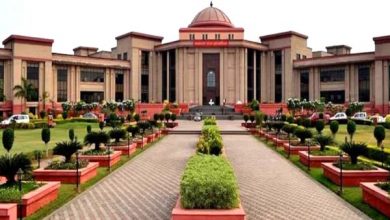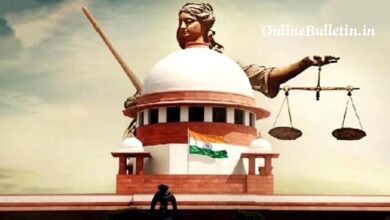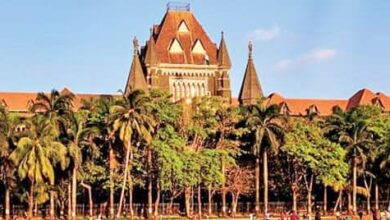सोशल मीडिया में SC-ST के खिलाफ टिप्पणी की तो जाएंगे जेल, हाईकोर्ट का अहम फैसला soshal meediya mein sch-st ke khilaaph tippanee kee to jaenge jel, haeekort ka aham phaisala

कोच्चि | [कोर्ट बुलेटिन] | SC-ST Act: सावधान ! सोशल मीडिया में अब अनुसूचित जाति व जनजाति (SC-ST) के लोगों के लोगों के खिलाफ अपमानजनक या अभद्र टिप्पणी करना भारी पड़ सकता है। आपने ऐसी टिप्पणियां कीं तो जेल जाना पड़ेगा।
केरल हाईकोर्ट ने एक मामले की सुनवाई करते हुए कहा यह आदेश दिया है। हाईकोर्ट ने कहा कि यदि सोशल मीडिया में अजा-जजा वर्ग के किसी व्यक्ति के प्रति अपमानजनक टिप्पणी की तो एससी-एसटी एक्ट के प्रावधानों के अनुसार कार्रवाई की जाए।
इस आदेश के साथ ही हाईकोर्ट ने आरोपी की अग्रिम जमानत याचिका खारिज कर दी। एक यूट्यूबर ने सोशल मीडिया में अजा-जजा के खिलाफ अपमानजक टिप्पणी करने के केस में जमानत मांगी थी।
जमानत अर्जी रद्द करते हुए केरल हाईकोर्ट ने कहा कि अनुसूचित जाति-अनुसूचित जनजाति के किसी व्यक्ति के खिलाफ ऑनलाइन माध्यम से की गई अपमानजनक टिप्पणी भी एससी/एसटी एक्ट के तहत अपराध मानी जाएगी।
याचिकाकर्ता ने एक साक्षात्कार में अजा-जजा वर्ग की एक महिला के खिलाफ अपमानजनक टिप्पणी की थी। यह साक्षात्कार बाद में सोशल मीडिया में अपलोड किया गया था।
मामले में गिरफ्तारी के डर से यूट्यूबर ने हाईकोर्ट से अग्रिम जमानत मांगी थी। उसने याचिका में कहा था कि पीड़िता के साक्षात्कार के दौरान वह मौजूद नहीं थी, इसलिए उसे अजा-जजा कानून के तहत कार्रवाई से राहत दी जाए।
उसकी यह भी दलील थी कि अजा-जजा वर्ग के प्रति अपमानजनक टिप्पणी तभी मानी जाए जब वह पीड़ित व्यक्ति के समक्ष की जाए। इसका विरोध करते हुए अभियोजन पक्ष ने कहा कि पीड़ित के सामने की गई टिप्पणी को ही अपमानजनक माना जाना गलत होगा।
डिजिटल मीडिया के युग में ऐसी व्याख्या कानून की नजर में गलत होगी। पीड़िता के वकील ने भी याचिका का विरोध किया और कहा कि आरोपी ने जानबूझकर और सार्वजनिक रूप से अजजा व्यक्ति का अपमान किया।
मामले से संबद्ध पक्षों की दलीलें सुनने के बाद हाईकोर्ट ने कहा कि साक्षात्कार देखने से पता चलता है कि कई जगह अपमानजनक शब्दों का उपयोग किया गया।
आरोपी ने पीड़िता का ‘अजा’ वर्ग के रूप में जिक्र किया था, जबकि वह जानता था कि वह एक अनुसूचित जनजाति की सदस्य थी। साक्षात्कार में इस्तेमाल किए गए शब्द प्रथम दृष्टया अपमानजनक हैं और ये जानबूझकर कहे गए थे।
इंटरनेट आने के बाद बदली परिस्थिति
हाईकोर्ट ने यह भी कहा कि इंटरनेट आने से पहले किसी साक्षात्कार को सीमित लोग ही देख या सुन सकते थे। अब सोशल मीडिया पर अगर कोई सामग्री अपलोड की जाती है तो उसे कोई भी कभी भी देख अथवा सुन सकता है। डिजिटल युग में किसी व्यक्ति की मौजूदगी ऑनलाइन या डिजिटल रूप में मानी जाएगी। यानी जब कोई व्यक्ति सोशल मीडिया पर अपलोड कंटेंट तक पहुंच जाता है तो वह प्रत्यक्ष या अप्रत्यक्ष रूप से वहां मौजूद माना जाएगा।

If you comment against SC-ST in social media, you will go to jail, important decision of High Court
Kochi | [Court Bulletin] | SC-ST Act: Beware! Making derogatory or indecent remarks against people belonging to Scheduled Castes and Scheduled Tribes (SC-ST) in social media can now be overwhelming. If you make such comments then you will have to go to jail.
The Kerala High Court, while hearing a case, said that this order has been given. The High Court said that if any derogatory remark is made in social media towards any person belonging to SC/ST category, then action should be taken as per the provisions of SC/ST Act.
With this order, the High Court dismissed the anticipatory bail application of the accused. A YouTuber had sought bail in the case of making derogatory remarks against SCs and STs in social media.
While canceling the bail application, the Kerala High Court said that derogatory remarks made against a person belonging to SC/ST through online medium will also be treated as an offense under the SC/ST Act.
In an interview, the petitioner had made derogatory remarks against a woman belonging to the SC/ST category. This interview was later uploaded in social media.
Fearing arrest in the case, the YouTuber had sought anticipatory bail from the High Court. She had said in the petition that she was not present during the interview of the victim, so she should be relieved from action under the SC/ST Act.
It also argued that derogatory remarks against the SC/ST class should be considered only when it is made in front of the aggrieved person. Opposing this, the prosecution said that it would be wrong to treat the remarks made in front of the victim as derogatory.
In the age of digital media, such an interpretation would be wrong in the eyes of the law. The counsel for the victim also opposed the plea and said that the accused intentionally and publicly insulted the ST person.
After hearing the arguments of the parties concerned in the matter, the High Court observed that the interview shows that derogatory words were used at many places.
The accused had mentioned the victim as ‘SC’ category even though he knew that she was a member of a Scheduled Tribe. The words used in the interview are prima facie derogatory and were said intentionally.
The situation changed after the advent of the Internet
The High Court also said that before the advent of the Internet, only a limited number of people could watch or listen to an interview. Now if any content is uploaded on social media, then anyone can see or listen to it at any time. In the digital age, the presence of a person will be considered online or digitally. That is, when a person accesses the uploaded content on social media, he will be considered to be there directly or indirectly.














